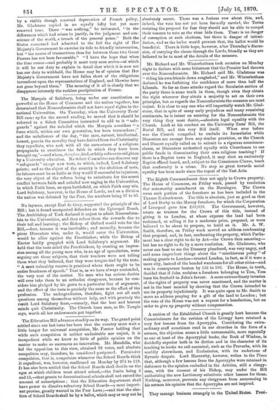The Education Bill advances steadily on its way. The grand
point settled since our last issue has been that the country must wait a little longer for universal compulsion, Mr. Forster holding that while such compulsion is neither undesirable nor unjust, it is inexpedient while we know so little of public opinion on the matter to make so enormous an innovation. Mr. Mundella, who led the opposition to this view, obtained 92 votes, and absolute compulsion may, therefore, be considered postponed. Permissive compulsion, that is, compulsion whenever the School Boards think it expedient, was, however, reaffirmed on Monday by 274 to 119. It has also been settled that the School Boards shall decide on the ages at which children must attend school,—the limits being 5 and 13,—that grants to denominational schools shall not exceed the amount of subscriptions ; that the Education department shall have power to dissolve refractory School Boards—a most import- ant proviso, greatly wanted in the Poor Laws ;—and that the elec- tion of School Boards shall be by a ballot, which may or may not be
absolutely secret. There was a furious row about this, and, indeed, the vote has not yet been formally carried, the Tories resisting the proposal for fear they should not be able to compel their tenants to vote as the vicar bids them. Thera is no danger of corruption at such elections, but there is danger of intimi- dation, and as the ballot would prevent that, the ballot would be beneficial. There is little hope, however, after Thursday's discus- sion, of carrying the clause through the Lords, friendly as they are believed to be to most of the details of the measure.






























 Previous page
Previous page